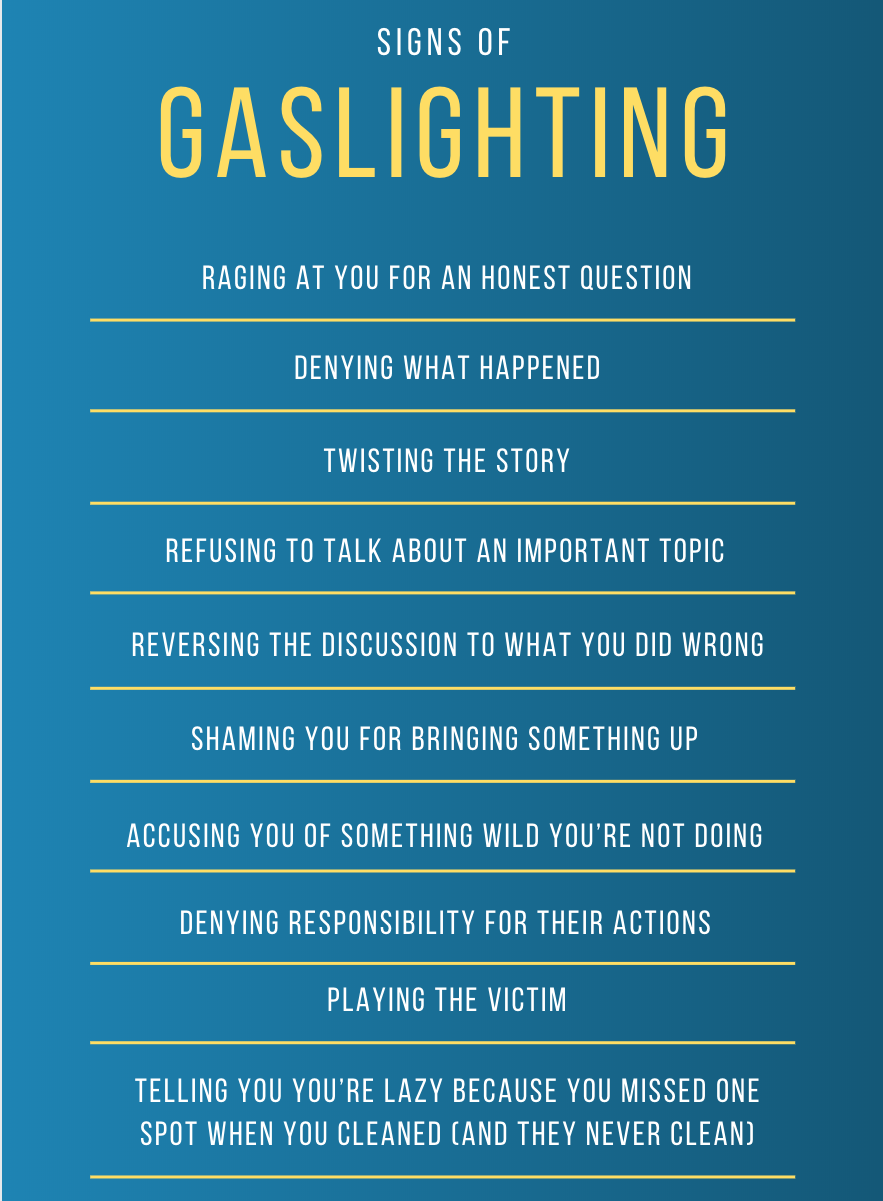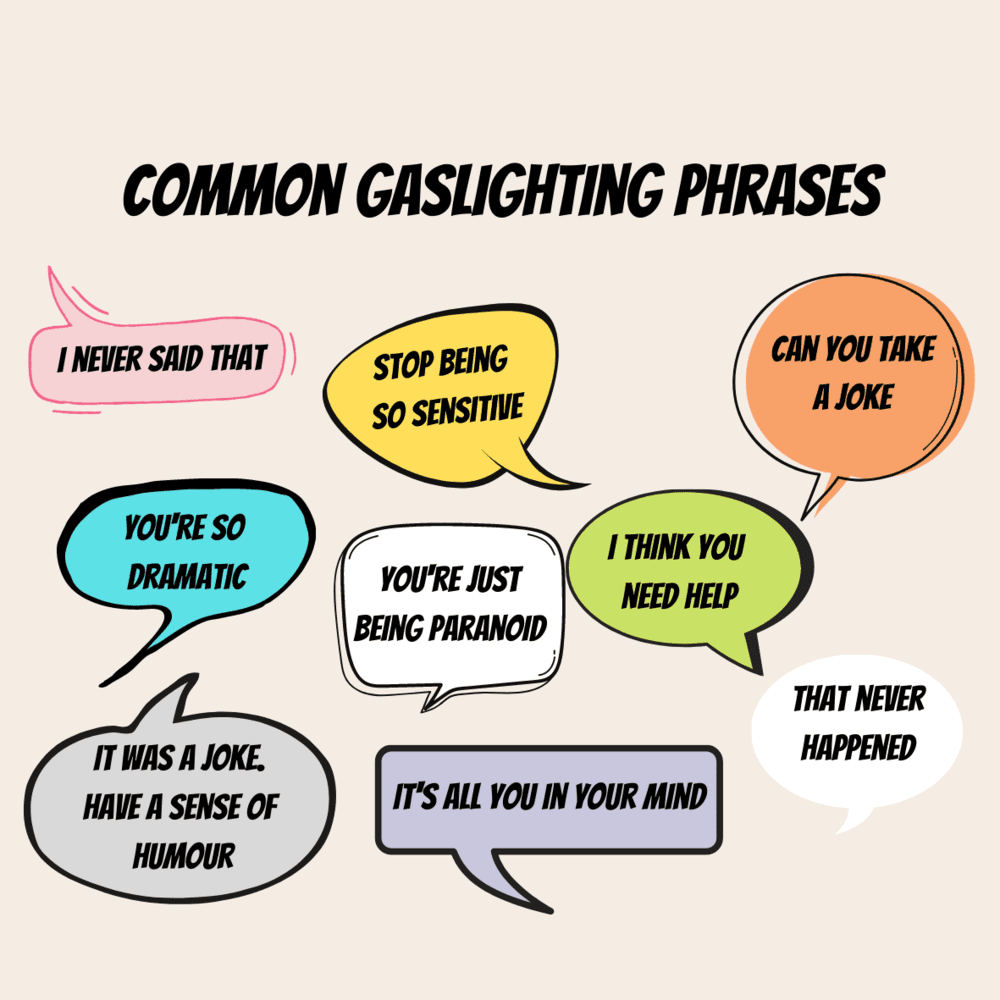Gaslighting Phrases in Relationships You Should Not Ignore
Gaslighting is defined as a form of emotional abuse where a person or group makes someone question their sanity, perception of reality, or memories. They do it by slowly manipulating their mindset and the information they receive. People experiencing gaslighting often feel confused, anxious, and unable to trust themselves. It is not easy to deal with gaslighting – how to deal with gaslighting is, undoubtedly, a process one needs to understand, especially if their partner frequently resorts to gaslighting during an argument in the relationship.

What Is Gaslighting?
The term gaslighting originated from the play Gas Light made in 1938, after which it was adapted into a movie. The 1944 movie Gaslight is an intriguing example of how the whole process erodes a person’s self-worth and esteem. In the movie, a man gaslights his wife and she begins to question her own sanity.
Many abusers use gaslighting together with all the other manipulation tactics. It is easy to do this because we use a term commonly as “he gaslighted you” implying it was a manipulation tactic in its own right that was employed. While using the word that way is fine, it is, however, misleading as it confuses what it really is. Gaslighting really is not only a manipulation tactic, it is an effect on a person that is/has been subjected to emotional and psychological manipulation tactics.
The gaslighting effect is when the manipulator denies and therefore invalidates reality. Invalidating distorts or undermines the victim’s perception of the world and can even lead them to question their own sanity. Almost all manipulation tactics will contribute to the gaslighting effect. It is an inevitable effect of being successfully manipulated in some way. You cannot make someone do something against their self-interest without them knowing they are even doing it and without distorting their own perceptions of reality in some way to some degree. So yes lying is a manipulation tactic and thusly contributes to the gaslighting effect as they all do.
How does gaslighting take place in relationships?
Gaslighting can cause a lot of pain in a relationship. So, what is gaslighting in relationships? This is an emotional abuse tactic. The abuser uses it to shift blame to the one who is being gaslighted. When a person uses gaslighting, they may be trying to alter the conversation or information to show that they are completely harmless, with no ill intentions.
Gaslighters use these phrases to exert power in a relationship. They may have a high desire to control the victim. Gaslighting is considered a form of emotional abuse because these phrases and sentences can ruin the victim’s self-esteem, confuse them, and even affect their sanity.
Gaslighting Techniques
“That never happened; you are making things up”, “Everyone agrees with me – because you’re overreacting all the time.” “You know no one else thinks that way you think, right?” If these sound familiar to you, you may have been a victim of “gaslighting”. This form of manipulation is so sneaky, it can be a little complicated. Let’s break it down into a few keys to the success of gaslighting:
They undermine you, often subtly.
Gaslighters operate on subtlety. They mess with your mind in a way that is confusing and maddening—in a way that isn’t always recognized as manipulation. (At least, not at first). They often achieve this by throwing out subtle comments like, “You must be imagining that. Did you not sleep well last night?” Comment of the like makes the victim feel cared for rather than manipulated.
They deflect arguments and objections.
Another strategy gaslighters use is deflection. If their victim has the courage to argue or object to what they are saying, the gaslighter will write them off in a casual manner: “Oh, you’re just overreacting.” “You’re still insecure from your past relationship.” “You’re just tired from work.” This deflection makes the victim feel crazy. And any rebuttals they have will only work against them, as the gaslighter continues to build their case.
They lead you to question everything you know to be true.
The very definition of gaslighting is manipulating someone to the point where they question their own reality. Gaslighters do so on small, medium, and large scales. For example, a gaslighting boyfriend might say to his girlfriend, “There’s no way you’re tired, you got plenty of sleep.” This is considered a small-scale example. A large-scale example, however, may involve contradicting obvious facts; a gaslighting mother might tell her son he’s grounded for not cleaning the kitchen. And even though he clearly remembers cleaning the kitchen, she’ll convince him that he never did such a thing.
What are the signs that you’re being gaslighted?
Gaslighting harms the victim because the victim may feel very confused and upset. They might start questioning the truth behind his/her/their perceptions. If you’re being subjected to gaslighting, there is a possibility that it may have been happening for a long time. This is because gaslighting is challenging to detect. It may not harm you initially. However, the long-term consequences may be detrimental. A victim of gaslighting may spiral into a strong sense of self-doubt, confusion, feeling anxious all the time, isolation, and eventually, depression. The effect of gaslighting on the victim may start with a feeling of disbelief. It can then turn into defensiveness, which can eventually result in depression.

Commonly used gaslighting phrases in relationships
Consider the following phrases to be examples of gaslighting in a relationship. The following examples of gaslighting phrases may seem harmless at first glance but always have sinister undertones to them. Read on to find out if you’ve ever heard these manipulative phrases said to you. Be aware, and please protect yourself from this form of emotional abuse.
Here are commonly used Gaslighting Phrases in relationships:
Stop being so insecure!
Gaslighters are great at playing the blame game. They’re good at shifting the blame on the victim. If you point out something about the abuser that concerns you, they will make you feel bad for even bringing it up. They don’t want to work on themselves. So, they may call you insecure.
You are just being paranoid!
This phrase is often used by gaslighters. Gaslighters often deny what they have been caught doing. They simply refuse to accept your thoughts on the subject and turn the tables on you. In an attempt to evade any confrontational conversations, gaslighters manipulate with phrases such as this when you might be suspicious of them doing something they shouldn’t. They’ll disregard your suspicion as though it’s a useless thought that shouldn’t be paid attention to. They don’t get to decide the value of your opinions and by assuming they do, they make you question your self-worth.
You’re way too emotional!
This is one of the most commonly used gaslighting phrases. Gaslighters lack empathy. However, they may not acknowledge this about themselves. Instead, they may divert the attention to you and comment on how emotional you are.
You are just making this up!
If your significant other has narcissistic personality tendencies, then you may have heard them say this. This is one of the most common phrases narcissists use. They may be prone to using denial as a defense mechanism. So, they may coerce you to alter your perception of a situation.
That never happened!
If you’ve been subjected to this phrase repeatedly, it may lead you to question your sanity and lose touch with reality.
You are being unnecessarily jealous!
Calling someone jealous and insecure for no reason is also emotional abuse.
To feel a sense of importance and control in a relationship, abusers might deliberately make the victim feel jealous. They revel in strong validation by applying this method. It fosters their own self-esteem while they disregard the hurt they might be causing you. This form of gaslighting in personal relationships can quickly make the relationship go downhill.
Stop exaggerating the situation!
Gaslighters use this phrase to convince the victim that the victim’s concerns are exaggerated and trivial. This is a direct attack on the victim’s rational abilities.
Can you not take a joke?
An abuser uses this phrase to say something hurtful and get away with it. That’s why they say something hurtful jokingly. If the victim then points out that it was rude or mean, or hurtful, the abuser may use this phrase to normalize their nasty comment.
You are just misconstruing my intentions.
This is one of the more direct gaslighting phrases used by abusers to deflect responsibility from themselves to the victim. They will often say that the situation was a misunderstanding and try to get away with it by using this phrase.
The problem isn’t with me; It is in you.
This classic phrase has one of the highest potentials to hurt the victim. The gaslighters use projection (a defense mechanism) to erode the victim’s self-esteem by saying this phrase.
I think you need help.
This phrase can be used healthily with good intentions, but it can also be misused. If your partner is quite manipulative by nature, then they can use this phrase to harbor self-doubt in the victim’s mind. They question the mental health status of the victim by deceiving them through this statement.
That was never my intention; Stop blaming me!
This is another deceiving statement made by gaslighters that are riddled with falsehood. By saying this, they’re trying to come clean and look innocent with pure intentions when they’re deflecting the issue.
Let’s start over from square one.
Narcissistic gaslighters commonly use this to avoid acknowledging and working on their own mistakes or issues. These abusers don’t like confronting their problems. They use this phrase as a way to skim over their past mistakes and start anew.
I won’t tolerate lies.
This is a commonly used diversion tactic where the gaslighter uses this phrase to avoid confrontation about their problematic behavior. If the claim raised by the victim doesn’t align with the abuser’s narrative, they use this phrase to divert.
You need to lose weight.
Gaslighters often want the victim to depend on them for validation and love. This is one of how the relationship becomes toxic. To create this dependence, they often resort to criticizing the victim’s physical appearance so that the victim ends up feeling wrong about their body image.
You’re frigid and bad in bed.
Apart from physical appearance, this is another favorite target area of attack where gaslighters make victims feel bad about their sexual health, sexual preferences, and sexuality as a whole. In addition, this phrase is often used to get away with unacceptable sexual behavior or cheating.
Your friends are idiots.
As mentioned earlier, isolation is a common consequence of being gaslighted. Family and friends can usually identify gaslighting activities even before the victim realizes this. Therefore, gaslighters use this phrase on victims to raise questions about the latter’s rationality and sow seeds of self-doubt and isolate the latter by saying this phrase.
If you loved me, you would….
This phrase is used tactfully to put the victim in a challenging position to feel obligated to forgive or excuse the gaslighter’s unacceptable behavior.
Just forget about it now!
These words are an effective way to completely sidetrack the issue. When you constantly avoid problems, you do not actually forget about them. Shying away from talking about the problem is one of the biggest signs of an unhealthy relationship. A part of them stays with you subconsciously because you are unable to talk about them on a conscious level. This can affect your thought process and will lock the door on a huge variety of suppressed concerns. Nobody else should get to decide what you should “forget about” and what deserves your attention.
It’s your fault I cheated.
This stems from a place of the unwillingness of the gaslighter to accept their fault. They just can’t admit to the fact that they cheated and it’s all on them. Gaslighters ignore their guilt by never admitting to their mistakes and hiding them behind their partner’s insecurities.
No one else would ever love you.
When the relationship turns very sour, this is one of the most commonly used Gaslighting Phrases. Say the victim musters the courage to propose a breakup. A gaslighter may take that opportunity to attack the victim’s self-worth directly. This phrase may make the victim feel like they’re unlovable or broken.
If you’re lucky, I’ll forgive you.
This is one of the most common narcissistic sayings. For example, after a narcissistic gaslighter successfully manages to shift the blame on the victim, the victim may start apologizing profusely for forgiveness. But when the gaslighter does end up forgiving the victim for something that the gaslighter did, they say this phrase to make the victim feel worse about themselves.
You’re supposed to love me unconditionally.
This is another one of those Gaslighting Phrases that abusers use when the relationship may be the breaking point to use the victim’s fundamental beliefs about love against them.
I remember you agreed to do that.
This phrase is another red flag where the abuser tries to distort the victim’s memories about a situation concerning the latter.
Just forget about it now.
The non-confrontational nature of abusers leads them to use this phrase often to sidetrack pertinent issues about the relationship.
This is why no one likes you.
This phrase is another jab at the victim’s self-esteem and self-worth to create a sense of dependency on the abuser and isolate the victim.
I’m not angry. What are you talking about?
The silent treatment is a common tactic used by narcissistic gaslighters by using this phrase to confuse the victim.
You’re gaslighting me!
Gaslighters use this phrase to buy some time for themselves. Unfortunately, they do this by distressing the victim by using this phrase. Remember these Gaslighting Phrases, and please be careful and protect yourself.


Overland Intensive Outpatient is a top-rated mental health and addiction treatment facility in Los Angeles, California. We create a safe space for patients to explore their mental health goals and needs. We offer a free, confidential consultation to any new clients and provide a number of different therapies to treat a wide spectrum of mental health struggles such as depression, anxiety, eating disorders, and substance use disorders. Our IOP and PHP facility is fully accredited. We are one of the highest-rated centers for mental health treatment in Los Angeles, California, which provides both in-person and online therapy. Our patients express endless gratitude and appreciation for the staff and the services and recommend us for their friends, colleagues, and community. There has never been a more important time to address mental health needs! Contact us today!
Published: January 15, 2022
Last Updated: August 24, 2025

Published: February 14, 2026
Medication-Assisted Treatment (MAT): How It Works?
Summary: Medication-assisted treatment (MAT) is an evidence-based approach to addiction treatment that combines FDA-approved medications with behavioral therapy and counseling to treat substance use disorders — primarily opioid and alcohol addiction. MAT is endorsed by the Substance Abuse and Mental Health Services Administration (SAMHSA), the National Institute on Drug Abuse (NIDA), and the World Health […]
Read more
Published: February 06, 2026
Talk Therapy: Types, Benefits & How It Works in California
Summary: Talk therapy — also known as psychotherapy — is a structured, evidence-based treatment approach in which a trained mental health professional helps individuals identify, understand, and change the thoughts, emotions, and behaviors that contribute to mental health conditions and substance use disorders. It is the foundation of treatment for depression, anxiety, PTSD, personality disorders, […]
Read more
Published: January 27, 2026
What Is DPD? Understanding Dependent Personality Disorder
Most people don’t ask, “What is DPD or Dependent Personality Disorder?” They come in feeling drained, anxious, and stuck in relationships that feel restrictive yet hard to leave. Being alone feels unsettling. Decision-making feels paralyzing. Reassurance becomes a daily necessity rather than a comfort. At Overland IOP in Los Angeles, we often see Dependent Personality […]
Read more
